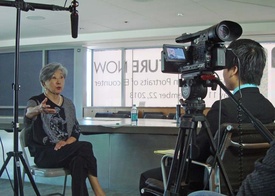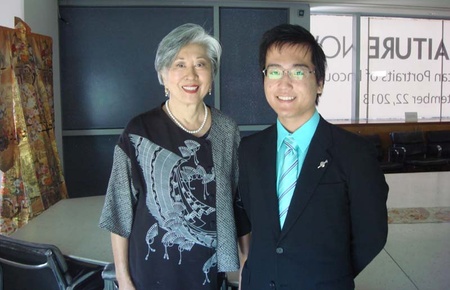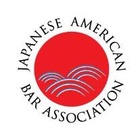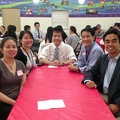“You need to, as an organization or as an individual, find ways to support individuals in the community.”
This was one of the final remarks made by Rose Ochi, a distinguished attorney and prominent civil rights activist, in this year’s first JABA Legacy Project interview. This profound message was marked with a sense of finality after all that was said before. But to fully understand the meaning of this advice, it is important to learn more about her personal history and career accomplishments.
Ms. Ochi’s early life includes memories of the sorrowful internment experience during World War II. As a child, she was rounded up along with her family and over 120,000 persons of Japanese ancestry, to live in roughly constructed barracks at Rohwer, Arkansas.
Although it was an emotionally difficult time for Japanese Americans like herself, it was primarily this tragic incident that motivated Ms. Ochi to attend law school and become a lawyer. It constantly fueled her passion for social justice and strengthened her resilience in difficult situations because she was not afraid to challenge the system if need be. While defending individuals from injustice and bettering the community, she remains undaunted by any obstacles.
Indeed, Ms. Ochi has always had a reputation for being a tough woman. She attributes her toughness not only to her camp experience but also to the postwar situation that involved racist bullies in her neighborhood.
“I returned to Los Angeles and encountered a lot of racist name-calling. At school they call you ‘dirty Jap,’ ‘go back to where you came from.’ …but I was willing to fight…and when you’re known to be someone who’s willing to fight, even though you’re tiny—and I’ll get hurt myself—you earn street respect so people tend to leave you alone.”
Later in life, when she was working in Los Angeles Mayor Tom Bradley’s office, she recalls having to work with the notorious Police Chief Ed Davis whom she describes as “brilliant, funny, but tough as nails.” Not surprisingly, there was not an ounce of trepidation in Ms. Ochi on challenging Davis regarding LAPD Deadly Force Policy after the Eula Love shooting.1 Little did she know then that word was getting out about her gutsiness.
“I was skiing up in Utah and I get a call—my UCLA classmate said this, ‘Rose, you got a call from the White House!’ ‘Tell them I’m busy.’…Somehow when people in the White House told me of my appointment to the Carter Immigration Commission due to my reputation of not being afraid of Ed Davis. That’s how I got appointed.”
Throughout her life, Ms. Ochi has dealt with numerous obstacles, taken on and completed myriad tasks, and achieved countless goals. When confronted with a problem, she will solve it with her chin up, eyes fixed, and mind set on the victory. Ms. Ochi is, to put in a nutshell, tough.
Perhaps this is the reason Ms. Ochi has been able to lead an awe-inspiring life. Upon graduating from law school, Ms. Ochi began working as a poverty lawyer at the Western Center on Law and Poverty serving as co-counsel in the Serrano v. Priest trial which challenged educational funding disparities in school districts.
She eventually served in many key positions for numerous organizations, which included Executive in Mayor Tom Bradley’s office, the first Asian American on the Board of Trustees of the Los Angeles County Bar Association, and the Carter Commission where she made key friends that she later enlisted for Wartime Redress. Indeed, the list of Ms. Ochi’s public service and accomplishments goes on: President Clinton first appointed Ms. Ochi to Associate Director of the White House Office of National Drug Control Policy, and then to be first Asian American woman to serve as an Assistant Attorney General heading the Department of Justice Community Relations Service.
Furthermore, Ms. Ochi has given back to her community in numerous ways, particularly within the Japanese American community. She helped the late Judge Edward Y. Kakita to establish the Japanese American Bar Association (JABA), which, among other things, worked to give Japanese American lawyers at the time a pathway to judgeships and access to the political arena. Today, JABA serves as one of the premier organizations of lawyers and judges that engage in community work.
In addition, Ms. Ochi was a powerful leader in both the redress movement and designation of Manzanar as a National Historic Site. Consequently, the Civil Liberties Act of 1988 was passed and overdue reparations and a Presidential apology were granted to camp survivors. Furthermore, she provided pro-bono legal counsel including Sue Embrey of the Manzanar Committee with whom she developed a strong, 30-plus year relationship. The interview was peppered with nostalgic anecdotes about her work with Ms. Embrey. At one point, Ms. Ochi reminisced:
“Actually, what I love most about Sue Embrey is, even though she had worked tirelessly to preserve Manzanar, when the former Deputy Mayor became the President of DWP (Department of Water and Power) who was vehemently opposed to the Manzanar, I faced losing my Executive job in the Mayor’s office, at that moment, Sue told me please, to give up the fight. I didn’t, and the rest is history.”
Along with Sue Embrey, Hiro Takasugawa a WWII veteran, and loyal colleagues, Jeff Matsui and Tom Bradley, Ms. Ochi was able to preserve the Manzanar camp to serve as a constant reminder of a dark chapter in America’s history. Indeed, for future generations of Americans and Japanese Americans in particular, this designation of Manzanar as a national historic site was significant.
One of the traumatic memories of camp experience that has empowered Ms. Ochi throughout her life is her first name. Her birth name had been “Takayo” which means “child with high ideals”, but “Rose” was assigned to her by a teacher from Arkansas in the Rohwer camp. It was a painful memory that is difficult to repress. Yet, over time, she has come to believe that not being considered as a “real American” but an “outsider” has given her the freedom to challenge wrongs. This has allowed Ms. Ochi to continue crusading against injustice. Even though she turned down an opportunity at a judgeship, she has no regrets. Her contributions provide rewards in and of themselves.
Recently, she helped to rescue Tuna Canyon WWII Detention Camp by getting Council approval for Historic Designation. She believes it is our moral duty to preserve the regrettable moments in our nation’s history in order that it never happens again. In the end, Ms. Ochi’s main message is: become involved in the community, help when needed, and give back often. After all, she has done so for the longest time and has not regretted a single moment.
Note:
1. In 1979, police shot and killed an unarmed woman by the name of Eula Love in South Central Los Angeles, California.
© 2013 Sean Hamamoto








